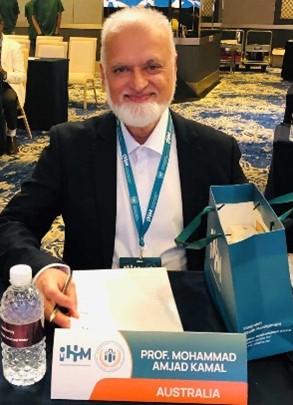
Prof. Mohammad Amjad Kamal: A Global Pioneer in Life Sciences
Born in Pakistan, Prof. Mohammad Amjad Kamal embarked on a remarkable intellectual journey that transcended borders, leaving a lasting impact on the global scientific community. His passion for life sciences, particularly biochemistry, first brought him to Saudi Arabia (1990-2000), where he made significant contributions to the field, enhancing scientific research and collaboration.
One of his key achievements is his longstanding scientific collaboration with world-renowned scientists, including Dr. Nigel H. Greig, Chief of the Drug Design & Development Section at the National Institute on Aging, NIH, USA. Together, they co-authored numerous papers, conducted groundbreaking experiments, and designed innovative compounds. Prof. Kamal's ability to manage high-volume, confidential work reflects his commitment to safeguarding the intellectual property of his co-authors and colleagues.
In 2000, Prof. Kamal relocated to Australia, where his pursuit of excellence in pharmacology and medicinal chemistry continued. His contributions, particularly through the establishment of the Novel Global Community Educational Foundation (www.NGCEF.net) in 2016, further solidified his role as a thought leader, inspiring both students and fellow researchers.
His thirst for knowledge and cultural exchange later led him to China, where he immersed himself in its academic landscape, fostering international collaborations and advancing research, particularly in the application of artificial intelligence in healthcare, medicine, skincare, wellness, and nursing.
Prof. Kamal's expertise spans neurodegenerative disorders (Alzheimer's, Parkinson's), toxicology, diabetes, and cancer. He has authored over 700 scientific articles in leading international medical journals and presented 65 abstracts at various conferences. His research portfolio includes cutting-edge work at the University of Sydney (2000-2003) as a U2000 postdoctoral fellow, focusing on the inhibition of the rate-limiting enzyme amido phosphoribosyltransferase.
A recognized authority in his field, Prof. Kamal serves as an associate, regional, and guest editor for numerous medical science journals, a role he has held since 2010. He is also recognized among the top 1% of highly cited researchers globally by Clarivate, underscoring his expertise and leadership in neurodegenerative disorders, toxicology, diabetes, and cancer research.
For more details on his work, visit his profile on Web of Science: [Prof. Kamal on Web of Science](https://www.webofscience.com/wos/author/record/J-2918-2014).